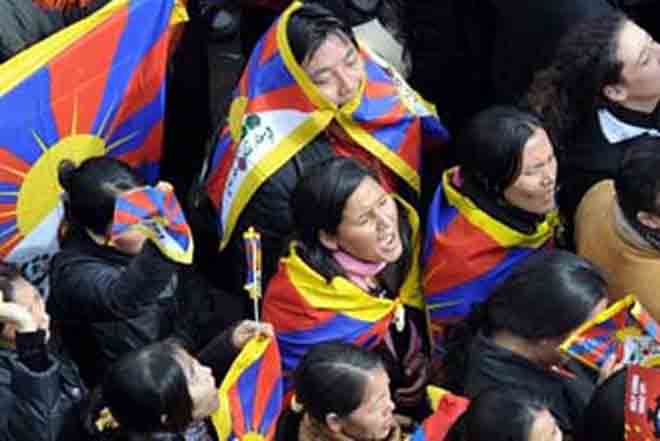China's leaders vowed on Thursday to severely punish those responsible for bloodshed in the nation's far northwest that left at least 156 people dead and exposed deep ethnic tensions, AFP reported.
The warning came as riot police and soldiers maintained a firm grip on Urumqi, the capital of Xinjiang region, where Muslim Uighurs and Han Chinese faced off this week in China's worst ethnic conflict for decades.
"The planners of the incident, the organisers, key members and the serious violent criminals must be severely punished," President Hu Jintao and the other eight members of the ruling Communist Party's elite Politburo said.
Local party leaders in Urumqi had on Wednesday warned that people involved in any killings would be sentenced to death, and earlier announced that more than 1,400 people had been arrested for their involvement in the unrest.
But the Politburo statement, released on Thursday following a meeting on Wednesday night, was the first comment from China's top leaders on the mayhem since it erupted on Sunday.
It emphasised that its priority was to ensure no further unrest.
"We must stress that stability overrides everything among cadres and the people of all ethnic groups in Xinjiang," it said.
Hu was forced to abandon a visit to Italy for the Group of Eight summit and return to China to deal with the situation, in what observers said was an unprecedented move that illustrated the severity of the crisis.
The first comments from the nation's political leadership about the bloodshed came as tentative signs of normality returned to Urumqi, a city of 2.3 million people.
Thousands of baton-wielding riot police and armed soldiers were still in the city, but their numbers were far fewer than in previous days.
Urumqi's mayor said late Wednesday the city was back under control, after thousands of Han Chinese roamed the streets vowing vengeance and to defend themselves in response to the initial violence authorities blamed on Uighurs.
There were no signs of the vigilantes, many of whom had been carrying poles, shovels and other makeshift weapons, and public buses as well as taxis were again plying the city's main thoroughfares.
In one of the more symbolic examples of a city trying to heal, security forces ended their main partition of Han Chinese and Muslim Uighur districts.
But even though more shops had also re-opened after a three-day government-mandated business closure, many were still shuttered and residents remained extremely doubtful that normal life would resume any time soon.
"How can it return to normal with so many soldiers?" said a Han woman surnamed Li in the city centre.
And the big bazaar in the main Uighur district remained shut, with Uighurs saying the closure was another example of the different rules they have to live by compared with the Han Chinese.
"They said we could re-open after three days. But today is the fourth day and they are not letting us open," said a clothing shop owner.
Xinjiang's eight million Uighurs have long complained about discrimination and repression under Chinese rule, and exiled leaders said those pent-up feelings of persecution led to Sunday's protests.
Soldiers and riot police had poured into the city after thousands of Uighurs began demonstrating. The protests turned violent with Uighurs attacking Han, and security forces cracking down.
The government said 156 people died in the unrest and most of those people were victims of the rioters, but exiled Uighur leaders say up to 800 may have been killed and security forces were responsible for many deaths.
Official news agency Xinhua reported late Thursday said that as of midday, "more than 1,000" family members had requested official assistance in tracking down relatives missing since the violence erupted Sunday.
At a regular briefing on Thursday, foreign ministry spokesman Qin Gang said "extremism, separatism and terrorism" were behind the unrest.
China says it faces a serious terrorist threat from Muslim separatists in Xinjiang, but rights groups have accused Beijing of exaggerating the threat in order to justify very tight controls in the region.
Many in Urumqi said they remained fearful about the future.
"It is much more calm today," said a relieved Han Chinese camera shop owner surnamed Ma.
"But... I don't know what will happen in the future. We are just going to have to wait and see. We hope it is going to return to normal."






